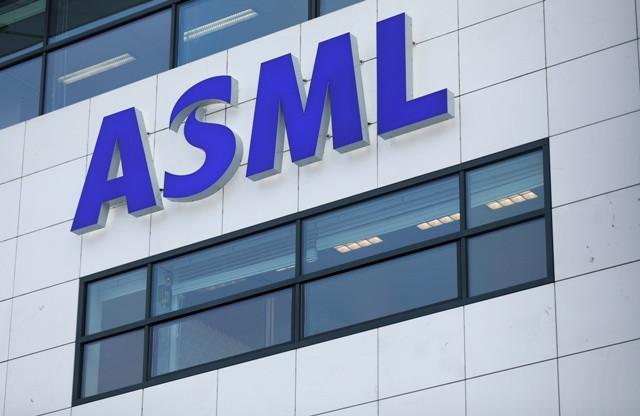Shares of ASML Holding NV surged in premarket trading Wednesday after the Dutch semiconductor equipment giant reported stronger-than-expected fourth-quarter earnings, defying concerns that China's DeepSeek AI breakthrough could curb demand for artificial intelligence chips.
The company posted earnings per share of €6.85, surpassing analysts' expectations of €6.68, while revenue hit €9.2 billion, exceeding the forecasted €9 billion, according to Bloomberg consensus estimates. ASML also projected first-quarter 2025 sales between €7.5 billion and €8 billion, above the €7.2 billion analysts had anticipated.
The earnings beat comes amid heightened scrutiny over the future of AI chip demand following DeepSeek's unveiling of R1, an open-source AI model promising performance on par with U.S. tech giants' offerings but at a fraction of the cost. The development triggered a major sell-off in semiconductor stocks earlier this week, with Nvidia losing nearly $600 billion in market capitalization on Monday-the largest single-day wipeout in U.S. history.
Despite the turmoil, ASML CEO Christophe Fouquet downplayed fears that a cheaper AI model would reduce semiconductor spending. "A lower cost of AI could mean more applications. More applications means more demand over time. We see that as an opportunity for more chips demand," Fouquet told CNBC's Arjun Kharpal.
ASML is the sole manufacturer of extreme ultraviolet (EUV) lithography machines, the advanced equipment required to produce the world's most powerful AI chips. Its machines, which cost nearly $400 million each, are sold to chipmakers such as Taiwan Semiconductor Manufacturing Co. (TSMC), which supplies semiconductors to Nvidia, Apple, and other tech leaders.
Growing concerns over export restrictions have also weighed on ASML's stock in recent weeks. The Netherlands and the U.S. have imposed tighter controls to limit China's access to cutting-edge chipmaking technology. While ASML has never been allowed to sell its EUV machines to China, its other semiconductor tools have seen surging demand in the region. ASML's revenue from China climbed to €9 billion in 2024, up from €6.4 billion the previous year, according to Bloomberg data.
Fouquet dismissed speculation that DeepSeek's AI model could derail capital expenditures from tech giants, including cloud computing hyperscalers such as Microsoft, Amazon, and Google, which are pouring billions into AI-driven data centers. "For the hyperscaler, the capex is today spent for investment," he said. "They are investing heavily in R&D. They continue to want to do that."
DeepSeek's R1 model, launched last week, has fueled debate over the sustainability of sky-high AI infrastructure spending. The model, which is open-source, has raised questions about whether tech giants like OpenAI and Microsoft will continue their aggressive investments in Nvidia's expensive graphics processing units (GPUs) used to train AI models.
Some investors feared that a shift toward cost-efficient AI could hit demand for ASML's EUV machines, which are essential for producing cutting-edge semiconductors. EUV tools accounted for €3 billion of ASML's €7.1 billion in fourth-quarter net bookings.
Yet Fouquet remained confident that AI's expansion would continue driving semiconductor demand across multiple devices beyond data centers. "For AI to really come to life in the next few years-not only with the hyperscalers, but with all of us in our phone, PC-we need AI to address two things: cost and energy consumption," he said.




